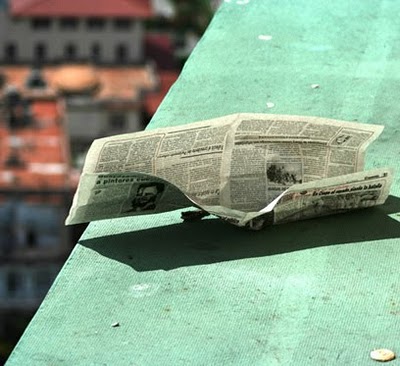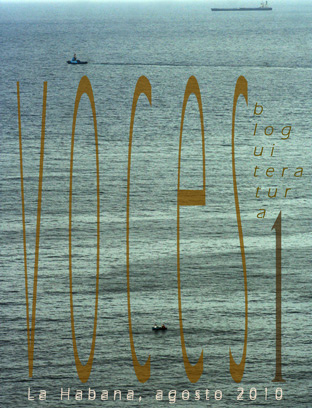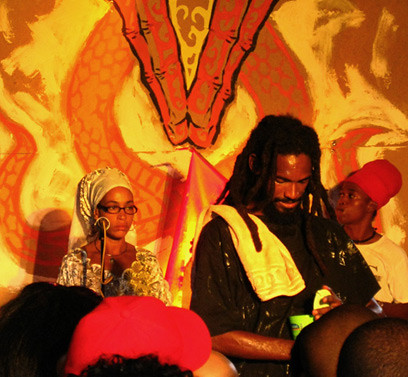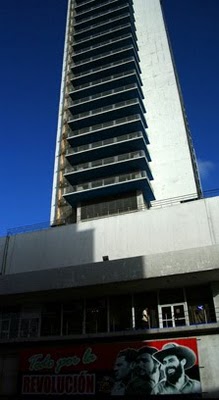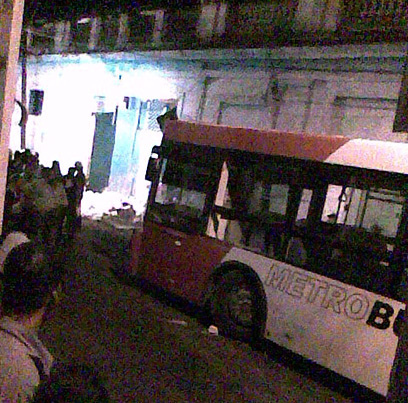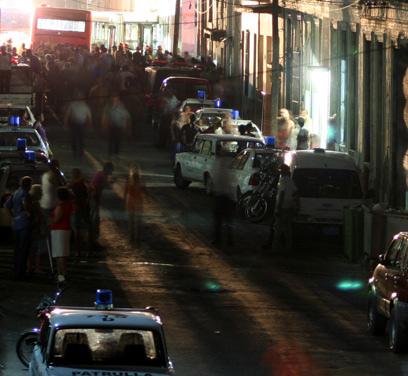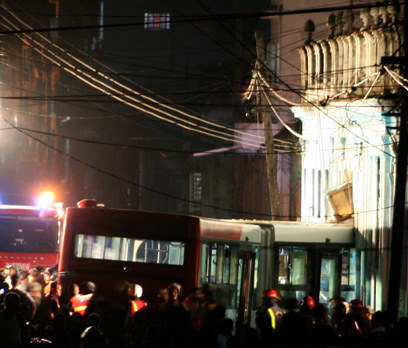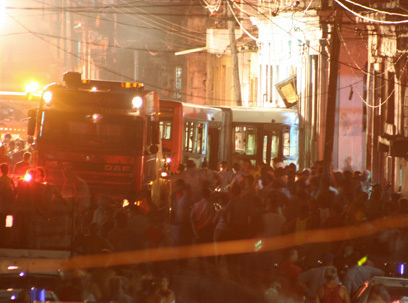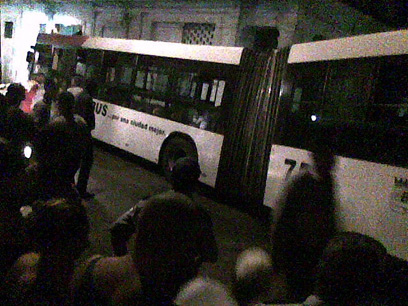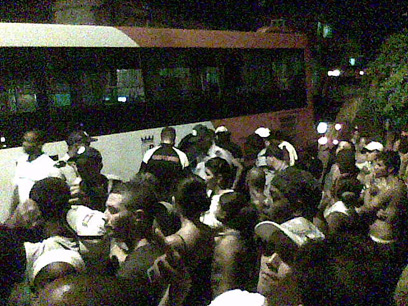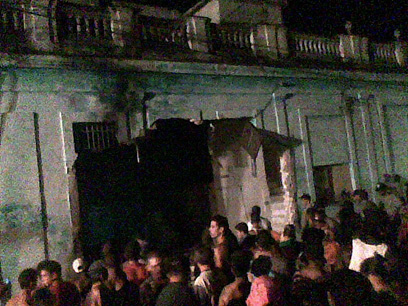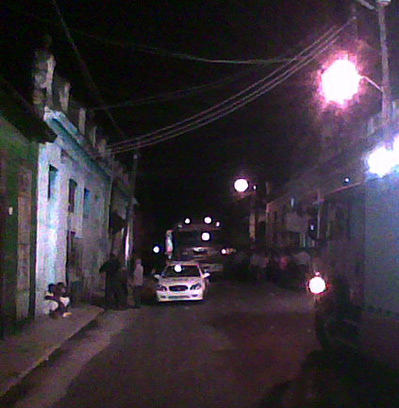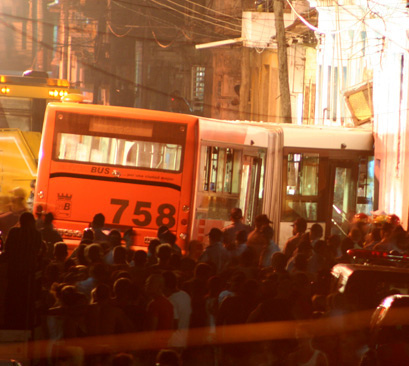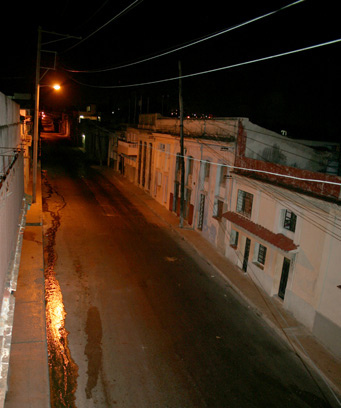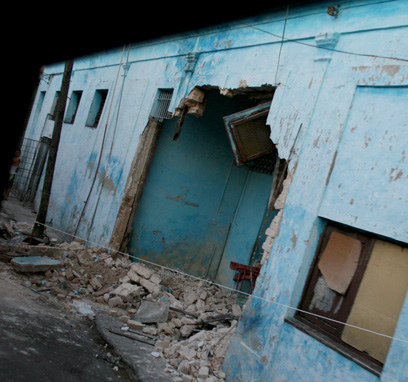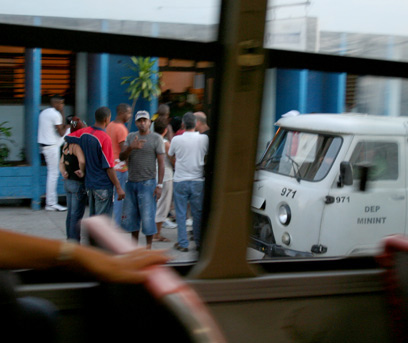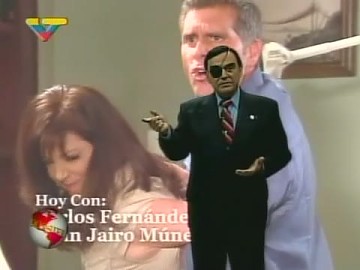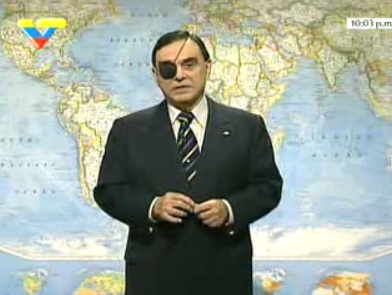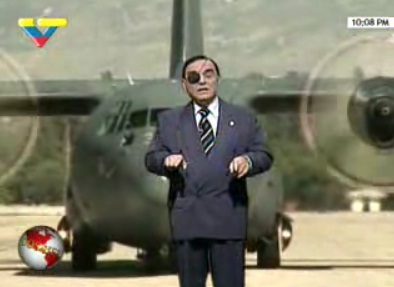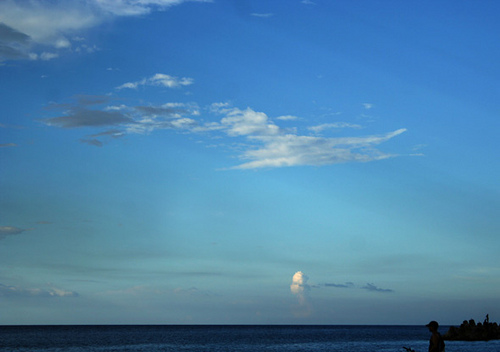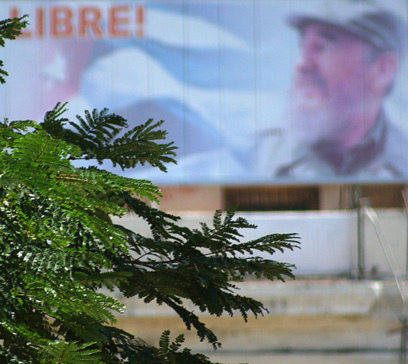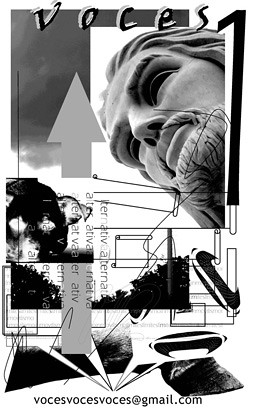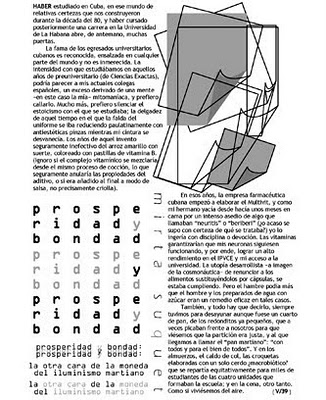
PROSPERITY AND KINDNESS: THE OTHER SIDE OF THE COIN of the Enlightenment Marti
Mirta Suquet
HAVING studied in Cuba, in this world of relative certainties they built for us during the eighties, and having subsequently completed a course at the University of Havana, many doors opened in advance.
The fame of Cuban university graduates is recognized and praised, and not undeservedly, in any part of the world. The intensity with which we studied in those years in the High School of Sciences, might seem, to my Spanish colleagues today, excessive, stemming from a mythomaniacal mind — in this case mind — and I prefer to remain quiet about it. Even more, I prefer to silence the stoicism with which we studied; the skinniness of that time in which my uniform skirt was gradually, with unaesthetic tweezers, being taken in while my waist diminished. The years of that invention, surely ineffective, of yellow rice colored with Vitamin B pills. (I don’t know if the vitamin complex would be blended in during the cooking process, which surely would annul the benefits of the additive, or if it was added at the end like salsa, not exactly Creole.)
In those years, the Cuban pharmaceutical company began developing the Multivit, and as my brother had been lying in bed for a few months with an intense siege of something called “neuritis” or “beriberi” (or perhaps it was known with certainty what it was?) I ingested them with discipline and devotion. Vitamins would guarantee that my neurons would continue functioning, and thus I would achieve a high score on the IPVCE exam, and my access to university. The Utopia being developed in the image of space flight, allowed is to replace food with capsules. But hunger was stronger than humans and sugar water preparations were an effective remedy in such cases.
Also,I have to admit, we always had breakfast even if just a quarter of a bread roll, perfectly round and small, at times cut in front of us so we could see that the partition was fair, what we came to call “Marti bread”: “With all and for the good of all.” And at lunch, cabbage soup, the croquettes made with one “macrobiotic” (?!) pig which was distributed equally to thousands of students in the four units that made up the school; and for dinner the same again. It was as if we lived on air.
Instead, we survived expanding our vital intensity to unsuspected limits. We didn’t give up the marches, parades, danced, field work and study. We resisted and asked the body to withstand double sacrifices: that we wouldn’t faint and we wouldn’t fail, that our fevered heads about support our projects and goals. The year 2000 was ours, and we were building a better and more prepared society. No doubt.
Wasting away was the quixotic ideal of the revolutionary left, the intellectual dreamer, the vanguard of bohemian transgressive. The belly would distinguish from the hoarding and pedestrian bourgeoisie of the refined aristocracy; it was, from the time of Cervantes’s text, the symbol of baseness and ignorance. As the gentleman tells his squire: “I, Sancho, was born to live dying, and you to die eating.” To live dying, to die eating, a pun too well-known by Cubans and sung as a hymn of war.
The Revolution leased out, by dint of food hardships, this well codified semiotic. In those years, the belly could be the footprint of a diversion of resources, illicit enrichment. Today it is the corporal mark of bad nutrition, the return of bread, rich sauces, while anorexic Europe boasts of its defatted food.
I remember on one occasion, we were promised that the semester’s pig would be given to the most outstanding group of the school for their members to have a party and invite their relatives. To promise this in 1993 was like announcing a day in paradise with a round-trip ticket. The group chosen was ours, after we had excelled in all the challenges of the competition. And days before the fiesta they canceled the invitations to our families — because only the city fathers would have the privilege of attending — and bit by bit we they were gilding the pill until from that pig we barely saw the croquettes. Faced with our protests, the director shamed us, “Arguing about a plate of cracklings!” and adding, “The true revolutionary does not live to eat, but rather he eats to live.”
I swear I repeated that phrase many times as a talisman against gluttony. And I searched for it in Marti’s work without finding it, until one day I found in The Miser by Molière, with an erudite footnote that said he was a Latin adage: “ede ut vivas, ne vivas ut edas.” In the play, one of the characters, Valerio gives Harpagon cooking lessons on how to make a dinner with little money: “We have to serve things that one can eat just a little of and be satisfied at the beginning… Some good beans, a little cake with chestnuts.” Infallible method: A plate of black beans!
Instead, the phrase of Marti that can be read in every Cuban classroom was that which prescribed what the purpose of culture should be: Freedom. To be educated is to be free.
Culture and freedom are terms written in determined contextual repertories of the Marti maxim, anchored in an ahistorical eternity, signifying almost nothing. They are two of the most productive concepts inherited from the control technologies of Modernity that, established as absolute, have obscured the ideology through which such signs become operative. The Enlightenment belief supposes a free will anchored in knowledge, but today we know that just “knowing” is the domain in which we are instituted like predetermined subjects, and that free will has ceased to be, long ago, a tangible possibility.
In any case, following Foucault, culture is a space of intervention and resistance — where the micro-physics of power is exercised — precisely because it is the network where systems of social identification are built. Freedom, in contrast, is, however minimally, that moment of resistance, of permanent tension that makes us constantly moving, as subjects, toward the absolute but always unattainable aspiration of power: the immobility. And as we move, we cancel the perfect definition.
The resistance — and the freedom — in the present moment we are living, strictly speaking, or primarily, comes through the resistance of the body. I am not speaking of official resistance, that asked for in exchange for collapses and massive holocausts, but the daily resistance, the only way to guarantee a minimum of freedom, and that includes, as strategies, the bazaar, the black market, improvisation, the scam. The search for alternatives to finding ways to live and parallel or compensatory happiness. To resist and resolve. To resolve to continue resisting. (Seen like this, the culture understood as erudition doesn’t guarantee, in the national terrain, any liberty. Other type of culture is imposed to manage to survive: the “struggle.”)
In the article “Traveling Teachers” from which the Marti precept is extracted, the idea of a human telos directed toward satisfying the desires of the body — the previously mentioned “live to eat” — is also repudiated: “Most men have slept on the ground. They ate and drank, but did not know. (…) Men are still eating machines, and relics of their worries.” Indeed, if we reverse the sentence it would say: when a relic of worries — among them, and critically, lack of food — torment man, he becomes an “eating machine.”
The obsession with the lack of food was what made us talk all day about impossible foods and sign in unison at the movies faced with a succulent scene. In Paradiso, the food leads us to a huge spinning mill that we barely dream faced with the appetizing proliferation of ingredients and dishes that mingle in the “gossá familia,” this metaphysical orgy in which entails all pleasures. Our table, small and dingy, no long assuming an enjoyment that promises a long-lasting, detailed tasting of unexpected combinations: new species, new textures and rhythms of swallowing and, what is most regrettable, no longer reconnects as the purest of religions: it does not encourage conversation until that state of light in which the dialog fills the ear like a crustacean fills the mouth. Colonel Cemi said, around the laden table: “The pleasure, that is for me a moment of clarity, presupposes dialog. (…) Without this dialog we’re invaded by a sensation of fragmentary vulgarity around the things we eat.”
With anguish, I recognize in Paradiso the mirage that counteracts the radiant poverty of Lezama, the real hunger of the writer, as Reynaldo González remembers in the program of Amaury Pérez, “With two that is wanted.” According to González, when he took his piece of meat, he went to the house of Lezama and sacrificed it in feeding not just the “spirit” of the teacher.
It happens, however, that we return to Marti’s phrase that combines culture and freedom to comment on a serious sin of omission. The phrase, in reality, is a kind of syllogism with three indispensable propositions that concatenated: “To be good is the only way to be happy. To be educated is the only way to be free. But in common human nature, one must prosper to be good.” Or, and it’s the same thing, prosperity would be the basis of this ethical edifice in which, after reaching well-being, one could be good (and, thus, happy) and learned (and, thus, free). “And the only way,” Marti continues, “open to continued and easy prosperity is that of knowledge, cultivating and taking advantage of the inexhaustible and indefatigable elements of nature.”
Close the idea, and return the role of knowledge, in this case, applied: culture is associated in its etymological sense to cultivate, fertilizing prosperity through work and the effective enjoyment of the goods we possess. This would make us prosperous and, again, free and good. (Marti, in turn, does not advocate that the farmer abandon the furrow to become learned; that the fields be filled with the invasive marabou weed while the minds are cultivated, but that a kind of “traveling teacher” goes to where the workers are, offering alternative knowledge.)
That goodness is related to prosperity (the bonanza) is not a contradiction — as revolutionary ethics almost always claimed, confident in the formative value of misery — though neither is it an a priori. But individual fulfillment offering prosperity (and not exactly for the well-being involved, but for the process of finding well-being) might make us better, but this feels like something out of a self-help manual.
We remember that the word “prosperous” comes from the Latin properus-a-um, endowed with the prefix “pro” (forward, in favor), and the Indo-European root spe. The Latin word spes (esperanza – hope) contain t same root. Etymologically “prosperous” means, then, going toward the expected, or as expected. Prosperity is the favorable course of an action or performance the success of a business and no, necessarily, an enrichment that embarrasses of discredits the owner. Rich, or wealth, however, come from the archaic German riks — the origin of the word reich — and have the Indo-European root reg (rey — king — regent); which means that in this case, the link between Power and peculiar seem to be contained in its origins. Villagers could never be rich — nor the farmers Marti refers to in the cited article — but they could be prosperous.
What my present colleagues don’t know is that the learning itself came to us with blood, or better yet, with hunger, and when we had to read so many books it helped to forge us as philologists, lying on the bunks of the dorm at F and 3rd with barely any toast and some tea in our bellies.
To have studied in Cuba was a real privilege. To have been a student of brilliant professors who throughout my life tried to make up for what the body lacked with the illusions of culture. They also gradually grew thinner; some seemed to expire after the lesson and continued to cling to their barely paying jobs. I remember our joy in some “little jaunt” we would have coincidentally sent some professor who never traveled on, so he could “recover.” On his return he told us proudly he had saved a lot of money and so was able to buy some books that were needed for the Department. And in fact, he might have gained a few pounds, barely changing his usual clothes, from some used clothing store, just like ours.
Today, much of what I owe to him, is not my enjoyment of the letters, but my quixotic taste for teaching (hard-fought labor, as everyone knows, with wealth, but not necessarily with prosperity), is not on the faculty. And I’m viscerally sorry that the students don’t have the opportunity to know the lean body and feverish agitation of Salvador Redonet; the almost mystical consecration of Ofelia García Cortiña; the folksy simplicity of Amaury Carbón,with his white, almost transparent, guayabera; the strength of Nara Araújo, full of farewell projects, and others many of whom have died in recent years, in full harness. Or the clueless genius of Beatriz Maggi, the stoic resistance of Teresa Delgado, the humility of Lupe Ordaz, and so many others who have retired or withdrawn from the institution. To their classes, one had to go, even when all you’d had to eat that day was a packet of peanuts bought from the nearest seller.
Now, I don’t know if with the plan for “emerging teachers,” some child could appreciate, in twenty years, the education received and the initial stages, the most important. I don’t know if the mere fact of having studied in Cuba will continue to be praiseworthy. I don’t even know what the motivations are that today drive young people to study: I suppose they are not the same as they were for us, or perhaps better. I trust that the profession that formed you could be exercised in society and that, once you have reached competency, it opens the doors to you to reach the necessary and earned reward. The prosperity that, according to Marti, would make us good and happy. That which does not conform with an old norm in which one has to decide whether to feed the body or the spirit.
August 11, 2010
